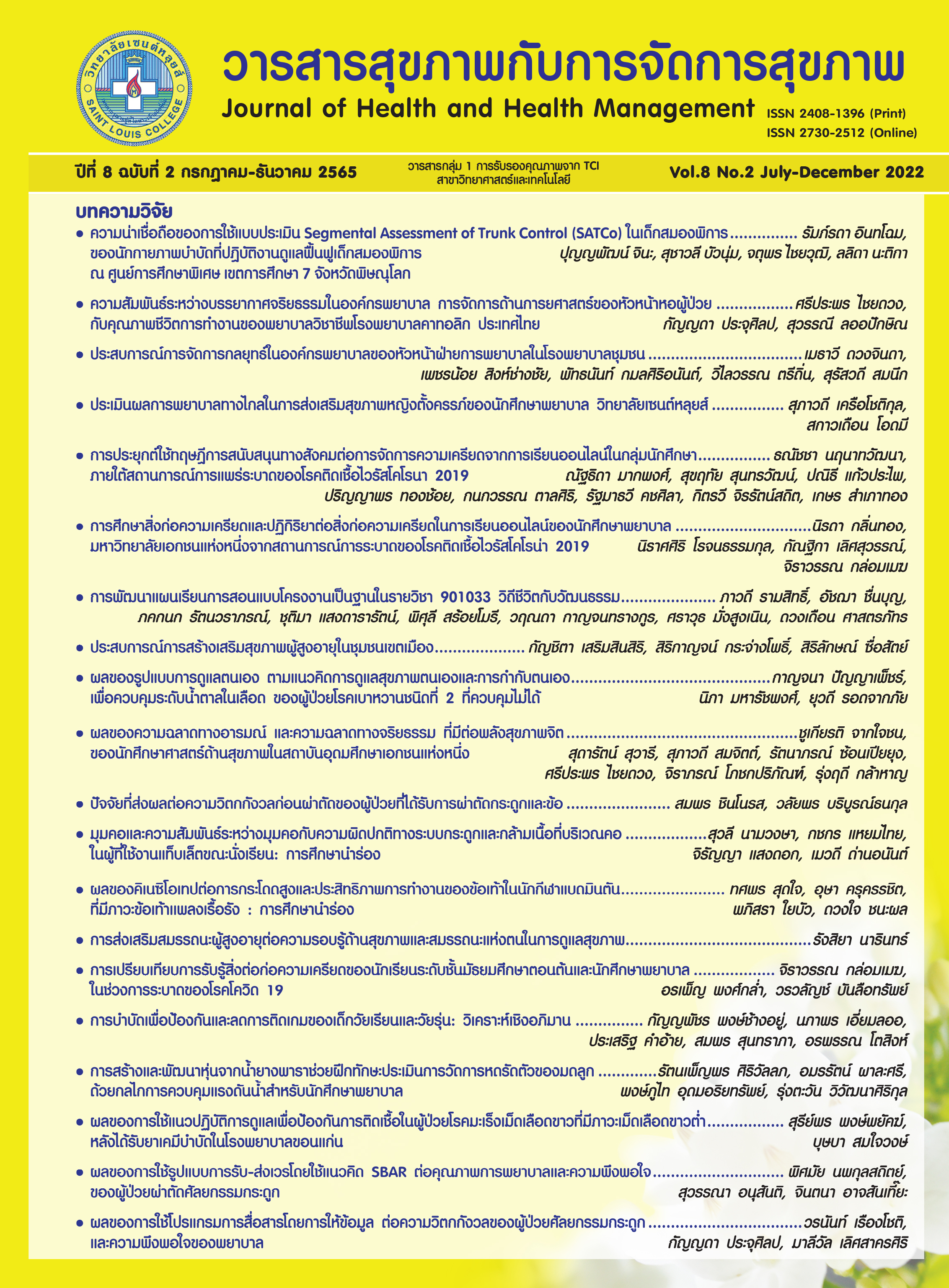Prevention and Reduction Therapy of Game Addiction in School- Age Children and Adolescents: A meta-Analysis
Keywords:
game addiction, prevention, Therapy, Cognitive Behavioral Therapy, school-age children, adolescentsAbstract
This meta-analysis study aimed to synthesize the research studies investigating prevention and reduction therapy program for game addiction in school-age children and adolescents. Twelve research studies that met the inclusion criteria were included. The results of this study found two groups for prevention and reduction therapy of game addiction: reduction of game addiction severity and prevention of game addiction behaviors.
The therapy for reduction of game addiction severity in children and adolescents consisted of two therapeutic modalities: Cognitive Behavioral Therapy (CBT) and pharmacological therapy. Cognitive Behavioral Therapy showed significant effect on decrease in time spent playing games (Odds Ratio -6.79; 95% confidence interval (CI) -9.46.-4.12 MD 0; P<0.0001). There was only one study examining effect of pharmacological therapy, meta-analysis could thus not be undertaken. The two therapies for prevention of game addiction behaviors included family-based intervention and life-skill training combined with group process. The result revealed that children and adolescents behaviors for preventing game addiction significantly improved through these therapies (Odds Ratio 3.89; 95% confidence interval (CI) 2.99, 4.79 MD 0; P<0.00001).
The study results are beneficial for two aspects. Family-based intervention and life-skill training combined with group process can be used for preventing game addiction behaviors in children and adolescents. Use of cognitive behavioral therapy delivered by specialists such as mental health and psychiatric nurses is also recommended to reduce severity of game addiction behaviors.
References
กรมสุขภาพจิต กระทรวงสาธารณสุข. (2564). รายงานการทบทวนสถานการณ์ และแนวโน้มการดำเนินงานด้านสุขภาพจิต ประกอบการจัดทำแผนยุทธศาสตร์ กรมสุขภาพจิต. สืบค้นค้นจาก https://dmh.go.th/main.asp
กรมสุขภาพจิต กระทรวงสาธารณสุข. (2562). สรุปการสำรวจความคิดเห็นเกี่ยวกับจุดแข็ง จุดอ่อน- โอกาส ความท้าทาย (SWOT) การดำเนินงานสุขภาพจิต และทิศทางการดำเนินงานสุขภาพจิตในอนาคต. สืบค้นจาก: http://www.dmh.go.th/oic.go.th
เกษกมล เกียรติพจนานันท์. (2553). ผลการใช้กระบวนการกลุ่มที่มีต่อการปรับเปลี่ยนพฤติกรรมการติดเกมคอมพิวเตอร์ของนักเรียนระดับประถมศึกษา โรงเรียนสันกลางเหนืออำเภอสันกำแพง จังหวัดเชียงใหม่ (วิทยานิพนธ์ปริญญามหาบัณทิต). มหาวิทยาลัยเชียงใหม่, เชียงใหม่.
ชนิดา ศรีนวล. (2551). โปรแกรมส่งเสริมพัฒนกิจของครอบครัว ในการป้องกันการติดเกมคอมพิวเตอร์ ในเด็กวัยเรียน (วิทยานิพนธ์ปริญญามหาบัณทิต). มหาวิทยาลัยมหิดล, กรุงเทพฯ.
นัยพินิจ คชภักดี. (2562). การพัฒนาสมองเด็กปฐมวัยแบบบูรณาการ วิทยาศาสตร์ยุคใหม่ที่ท้าทายต่อการพัฒนามนุษย์ . สืบค้นจาก: https://www.cf.mahidol.ac.th
สุปราณี น้อยตั้ง, สุวรรณี ละออปักษิณ, และชัยณรงค์ นาคเทศ. (2564). ภาวะสุขภาพของเด็กวัยเรียนระดับประถมศึกษาเขตสาทร กรุงเทพฯ. วารสารสุขภาพกับการจัดการสุขภาพ, 7(2), 47-64.
สุริยเดว ทรีปาตรี. (2561). ทำความรู้จักเด็กยุค Generation Alpha. สืบค้นจาก: https://www.trueplookpanya.com/dhamma/content/76263
อรอานันท์ ใสแสง. (2552). ประสิทธิผลของการประยุกต์ใช้แนวคิดการพัฒนาทักษะชีวิตร่วมกับแรงสนับสนุนทางสังคมเพื่อป้องกันการติดเกมในนักเรียนชั้นมัธยมศึกษาตอนต้น โรงเรียนขยายโอกาสทางการศึกษา อำเภอเมือง จังหวัดหนองคาย. (วิทยานิพนธ์ปริญญามหาบัณทิต). มหาวิทยาลัยขอนแก่น, ขอนแก่น.
Apisitwasana, N., Perngparn, U., & Cottler, L. B. (2018). Effectiveness of school-and family-based interventions to prevent gaming addiction among grades 4–5 students in Bangkok, Thailand. Psychology research and behavior management, 11, 103-115
Du, Y., Jiang, W., & Vance, A. (2010). Longer term effect of randomized, controlled group cognitive
behavioral therapy for internet addiction in adolescent students in Shanghai. The Australian and New Zealand Journal of Psychiatry, 44(2), 129-134.
Deng, L. Y., Liu, L., Xia, C. C., Lan, J., Zhang, J. T., & Fang, X. Y. (2017). Craving behavior intervention in ameliorating college students’ internet game disorder: A longitudinal study. Frontiers in Psychology, 8(1), 526-536.
Gaetan, S., Bonnet, A., Bréjard, V., & Cury, F. (2014). French validation of the 7-item Game Addiction Scale for adolescents. European review of applied psychology, 64(4), 161-168.
Higgins, J. P., Altman, D. G., Gøtzsche, P. C., Jüni, P., Moher, D., Oxman, A. D., ... & Sterne, J. A. (2011). The Cochrane Collaboration’s tool for assessing risk of bias in randomised trials. Bmj, 343. doi: https://doi.org/10.1136/bmj.d5928
Higgins, J. P., Thomas, J., Chandler, J., Cumpston, M., Li, T., Page, M. J., & Welch, V. A. (Eds.). (2019). Cochrane handbook for systematic reviews of interventions. John Wiley & Sons.
Krossbakken, E., Torsheim, T., Mentzoni, R. A., King, D. L., Bjorvatn, B., Lorvik, I. M., & Pallesen, S. (2018). The effectiveness of a parental guide for prevention of problematic video gaming in children: A public health randomized controlled intervention study. Journal of behavioral addictions, 7(1), 52-61.
Kim, S. M., Han, D. H., Lee, Y. S., & Renshaw, P. F. (2012). Combined cognitive behavioral therapy and bupropion for the treatment of problematic on-line game play in adolescents with major depressive disorder. Computers in human behavior, 28(5), 1954-1959.
Li, H., & Wang, S. (2013). The role of cognitive distortion in online game addiction among Chinese adolescents. Children and youth services review, 35(9), 1468-1475.
Moher, D., Shamseer, L., Clarke, M., Ghersi, D., Liberati, A., Petticrew, M., ... & Stewart, L. A. (2015). Preferred reporting items for systematic review and meta-analysis protocols (PRISMA-P) 2015 statement. Systematic reviews, 4(1), 1-9.
Park, J. H., Lee, Y. S., Sohn, J. H., & Han, D. H. (2016). Effectiveness of atomoxetine and methylphenidate for problematic online gaming in adolescents with attention deficit hyperactivity disorder. Human Psychopharmacology: Clinical and Experimental, 31(6), 427-432.
Torres-Rodriguez, A., Griffiths, M. D., Carbonell, X., & Oberst, U. (2018). Treatment efficacy of a specialized psychotherapy program for Internet Gaming Disorder. Journal of Behavioral Addictions, 7(4), 939-952.
Zajac, K., Ginley, M. K., Chang, R., & Petry, N. M. (2017). Treatments for Internet gaming disorder and Internet addiction: A systematic review. Psychology of Addictive Behaviors, 31(8), 979.
Zhang, J. T., Yao, Y. W., Potenza, M. N., Xia, C. C., Lan, J., Liu, L., ... & Fang, X. Y. (2016). Altered resting-state neural activity and changes following a craving behavioral intervention for Internet gaming disorder. Scientific Reports, 6(1), 1-8.
Zhang, J. T., Yao, Y. W., Potenza, M. N., Xia, C. C., Lan, J., Liu, L., ... & Fang, X. Y. (2016). Effects of craving behavioral intervention on neural substrates of cue-induced craving in Internet gaming disorder. NeuroImage: Clinical, 12, 591-599.
Downloads
Published
How to Cite
Issue
Section
License
Copyright (c) 2022 Journal of health and health management

This work is licensed under a Creative Commons Attribution-NonCommercial-NoDerivatives 4.0 International License.




